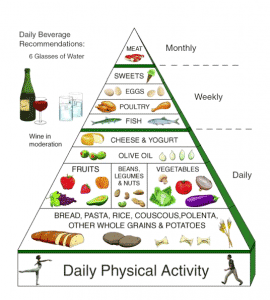Mediterranean Diet May Reduce Heart Disease Risk By Up to 30%
- Posted on: Feb 25 2013
Drs. Caren and Urman have been recommending a Mediterranean-style diet to their patients for the last decade based on an abundance of evidence showing its benefit in patients with known heart disease. In addition, numerous studies had shown that adherence to a Mediterranean diet was associated with a smaller waist circumference, lower levels of triglycerides, blood sugar and blood pressure, and reduce risk of pre-diabetes.
While our doctors were believers, whether a Mediterranean-style diet would benefit the general public has been a topic of much speculation for others for well over a decade.
A new study seems to be putting the debate to rest. The New York Times (and numerous other newspapers) reported on breaking research emphasizing a link between heart health and a Mediterranean-style diet.
The findings – published by The New England Journal of Medicine – “were based on the first major clinical trial to measure the [Mediterranean] diet’s effect on heart risks,” reports the Times. Participants were men between the ages of 55 and 80 and women between the ages of 60 and 80 who had no cardiovascular disease at the time of enrollment, but one or more risk factors, including Type 2 diabetes, hypertension, elevated cholesterol and/or tobacco use. Each was assigned a Mediterranean-style diet or a control diet and monitored for approximately 3-6 years. The findings were so conclusive that researchers decided to end the trial ahead of schedule.
“Until now, evidence that the Mediterranean diet reduced the risk of heart disease [in the general population] was weak, based mostly on studies showing that people from Mediterranean countries seemed to have lower rates of heart disease,” reports the Times. This study – funded by the Spanish government’s Instituto de Salud Carlos III among others – finds that, “About 30 percent of heart attacks, strokes and deaths from heart disease can be prevented in people at high risk if they switch to a Mediterranean diet rich in olive oil, nuts, beans, fish, fruits and vegetables, and even drink wine with meals.”
A Closer Look at the Mediterranean Diet
Where Other Diets Fail, Eating Mediterranean Style Succeeds
The elements of the Mediterranean diet include:
Daily vegetable and fruits
- Monounsaturated fats, such as olive oil
- Whole (unrefined) cereal grains
- Low-fat dairy
- Weekly poultry
- Fresh fish
- Nuts (not salted, preferably raw)
- Legumes
- Moderate alcohol intake
- Low red meat consumption
- Low sugary food consumption
Click here for Tips for Mediterranean-style Heart Healthy Meals
What To Keep “In the Pantry” at home to follow a Mediterranean Diet:
Extra virgin olive oil: one can use a less expensive one for cooking and a cold-pressed, unfiltered, “gourmet” type for dressings and drizzling.
Whole Grains: Bulgur, barley, and brown rice (both long-grain and short-grain and “wild” rice)
Dried and canned beans: Chickpeas, lentils, red kidney beans, white Tuscan beans
Dried fruits: Dates, figs, raisins, cherries, apricots
Wine: Preferably red
The Basics:
Key components: Fresh vegetables and fruit, nuts, herbs and garlic
Primary protein source: Fresh fish / seafood and beans (legumes)
Main fat source: Olive oil (preferably extra-virgin)
Important limits: Red meat (once a week or even once a month); eggs (less than once or twice a week)
Bonus beverage: Wine (red possibly best), 1 – 2 glasses a day.
Now that we can see the connection between a Mediterranean diet and a reduced incidence of major cardiovascular events, let’s take a closer look at what sets this eating plan apart. Common in countries such as Greece and Southern Italy, a Mediterranean diet is abundant in vegetables, fruits, whole grains and fish. Meats and sugary foods are eaten sparingly, and the diet is rich in nuts, legumes, olive oil and even a glass of red wine here and there. Real Mediterranean cuisine also can be found in the foods of Spain, provencal France, Turkey, Lebanon, Israel, Morocco and Tunisia. So very different tastes, from creamy and garlicky hummus to chewy calamari to sweet baklava can be part of a Mediterranean diet.
While not a “low fat” diet, understand that the fats consumed in a Mediterranean diet tend to be unsaturated fats, i.e., the “good” fat. Saturated fats on the other hand – like those found in cheese and red meat – can contribute to high levels of LDL cholesterol and other health issues. The value of the Mediterranean diet is also thought to be due to several other factors including anti-inflammatory effects, decreased oxidative stress, a reduction in insulin resistance (which can lead to type II diabetes), beneficial effects on arterial health (endothelial function and endothelial progenitor cells) and obesity.
It is also helpful to think of the Mediterranean diet more as a Mediterranean “lifestyle.” Beyond food choices, Mediterranean cultures tend to emphasize the importance of healthy physical activity and low stress – factors that both tend to contribute to a lifetime of heart health!
More Information about a Delicious, Practical and Heart-Healthy Mediterranean Diet
A Healthy Diet That Includes, Yes, Chocolate (NY Times)
When Diet Meets Delicious (NY Times)
Click here for Heart Healthy Mediterranean Meal Ideas (Gaples Institute for Integrative Cardiology)
Cardiologists in Los Angeles
To learn more about reducing your risk of cardiovascular disease – or to schedule an appointment – we encourage you to contact our office at (310) 659-0714. You can also fill out our online contact form or visit us on Facebook, Twitter or Google+. We look forward to hearing from you.
Reviewed by Mark K. Urman, MD and Jeffrey F. Caren, MD
Last updated: 04/24/2013
PLEASE NOTE: The information above is provided for general informational and educational purposes only and should not be used during any medical emergency. The information provided herein is not intended to be a substitute for medical advice, nor should it be used for the diagnosis or treatment of any medical condition. Accordingly, it should not be relied upon as a substitute for consultation with licensed and qualified health professionals who are familiar with your individual medical needs. Call 911 for all medical emergencies. Links to other sites are provided for information only – they do not constitute endorsements of those other sites. Please see Terms of Use for more information.
©2013 CORMedicalGroup, Inc. LosAngeles, California. All Rights Reserved.
Posted in: Heart Health Blog



 Daily
Daily 